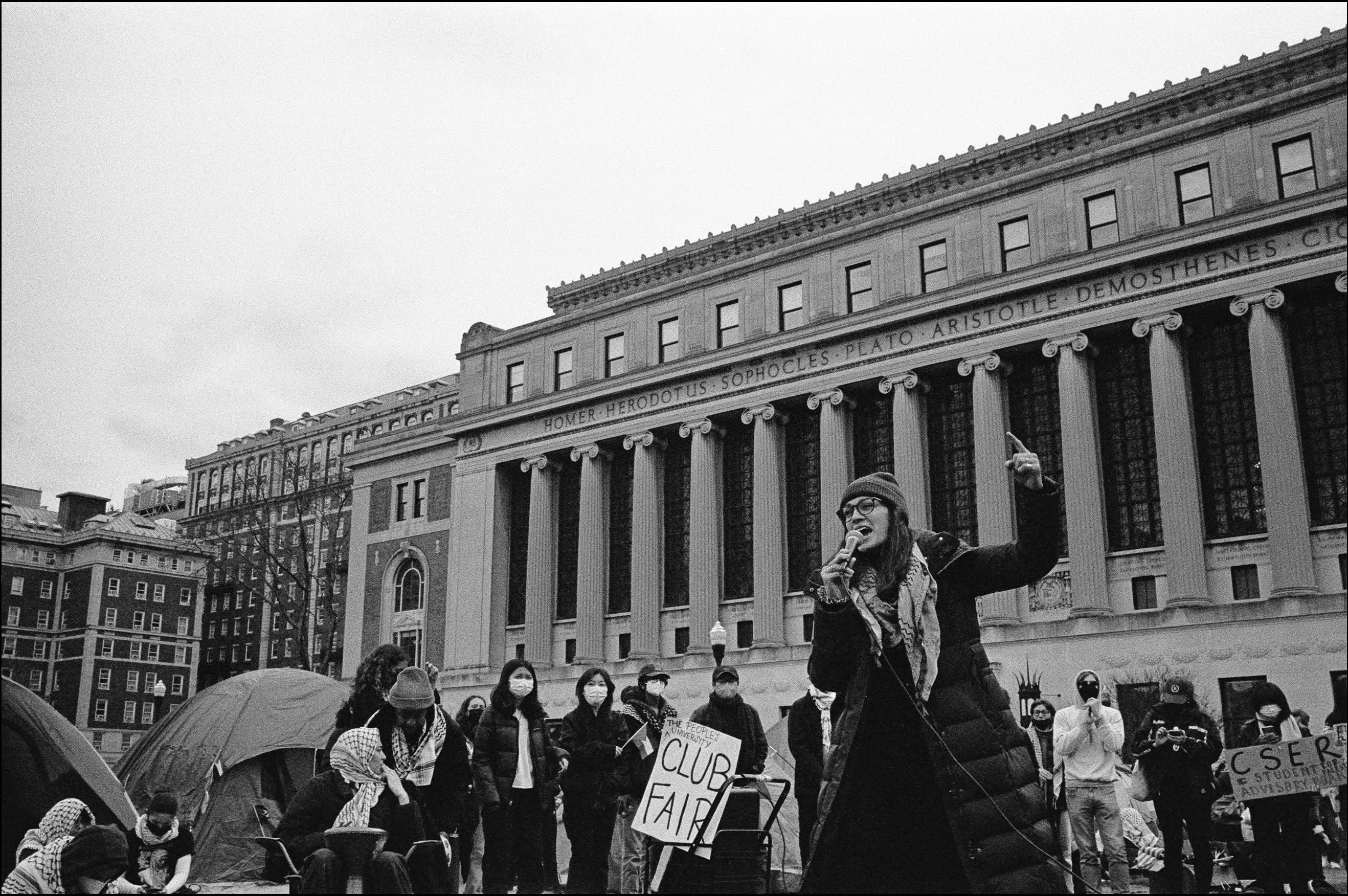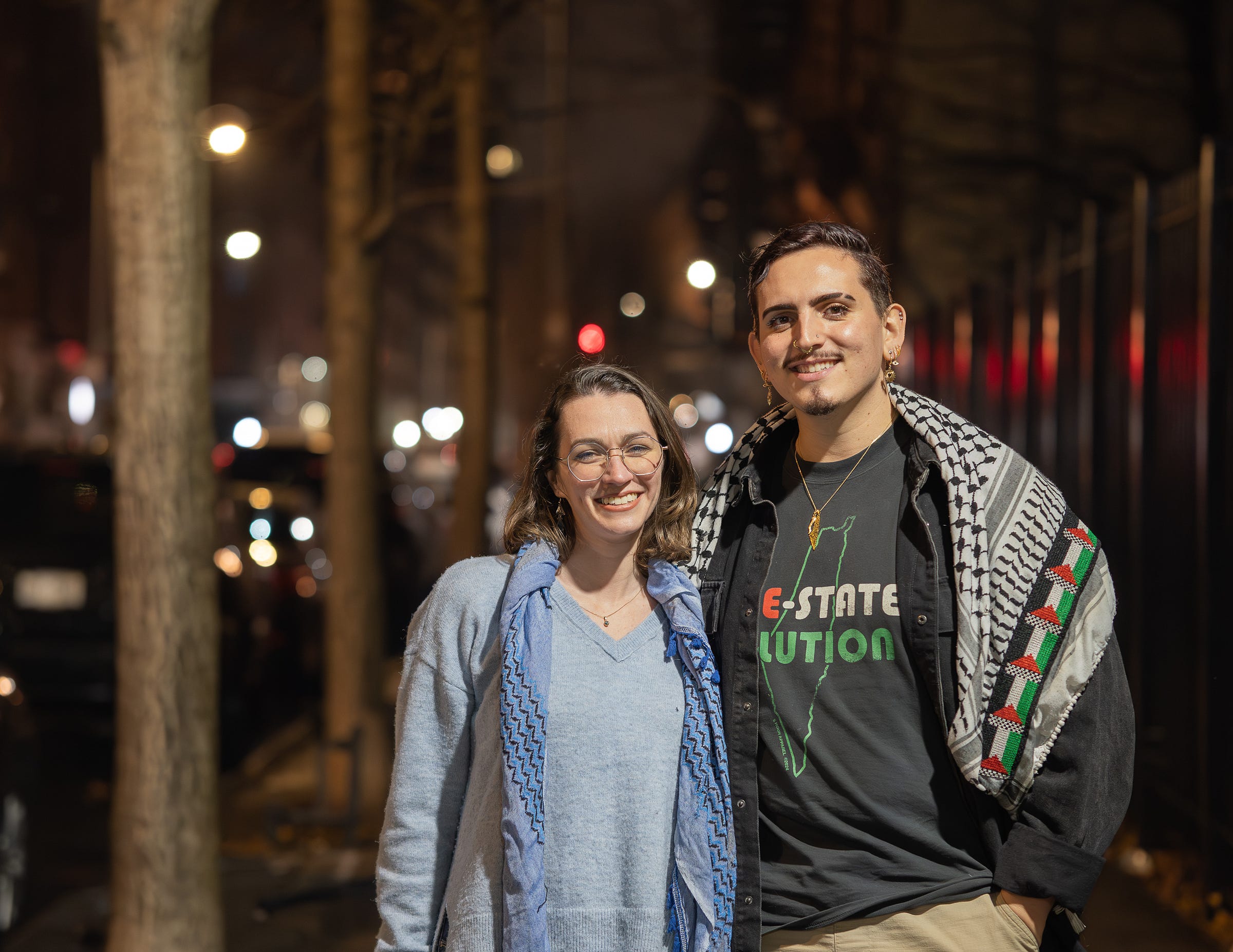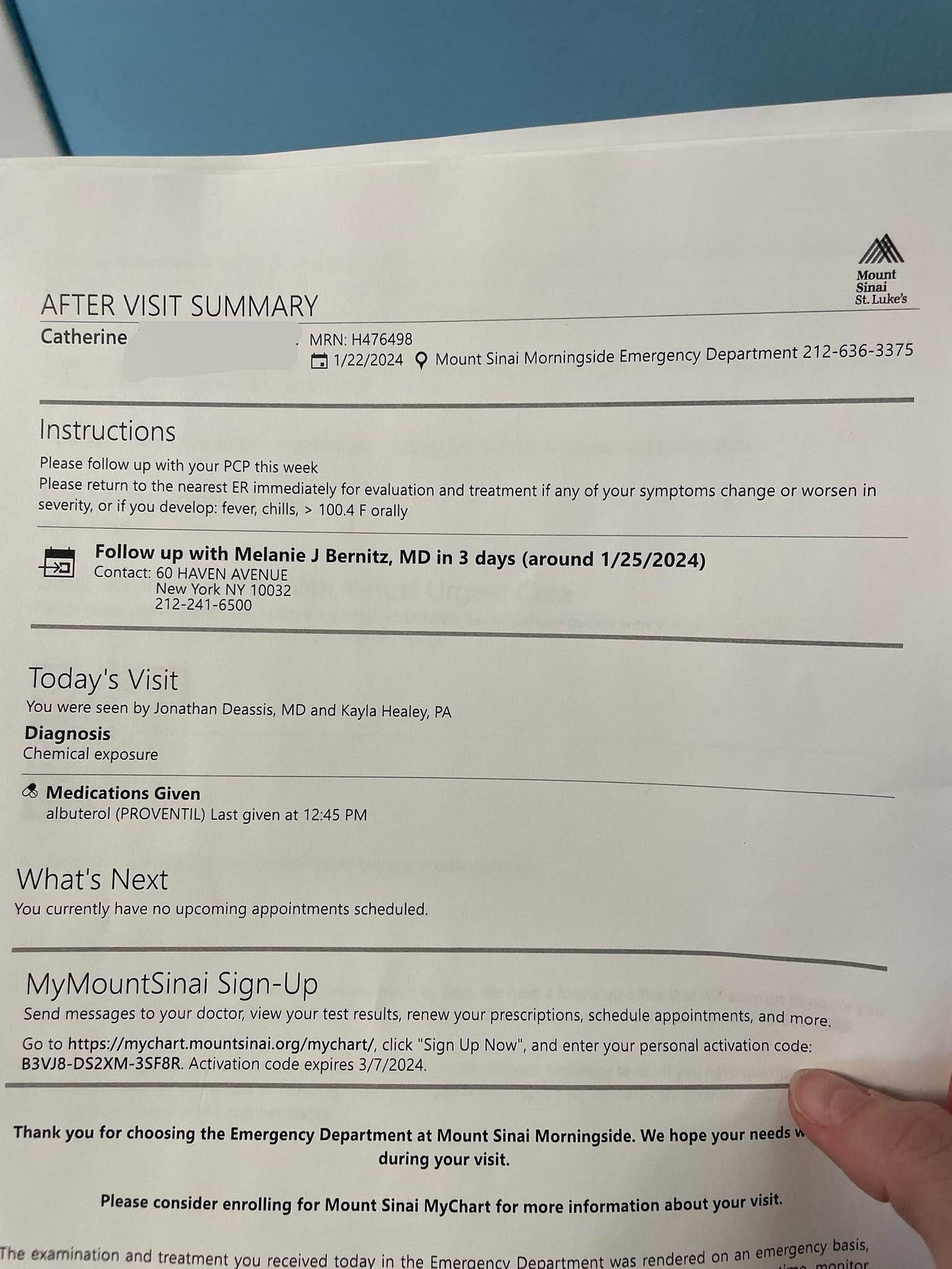Columbia students just sued the university for attacks on pro-Palestine activism
As Trump threatens to deport ‘pro-Hamas’ students, campus activists who were suspended last spring fight back

Three students from Columbia University filed a lawsuit on Monday morning against the school administration for their suspensions related to their pro-Palestine activism on campus. Among the claims in the complaint, the students state that the university violated its own policies during the disciplinary process, that the university targeted the students for their views, and that it violated New York’s landlord tenant laws when it evicted the students from university housing.
“The university just pulled out all the roadblocks and threw out its rule book in an attempt to punish and silence the plaintiffs however they could,” James Carlson, an attorney representing the students, told Drop Site News. “Whether it was repeatedly siccing the police on the plaintiffs to violently arrest them for peaceful protest or whether it was diverting them into an illegitimate disciplinary program that threw out their due process rights or whether it was turning a blind eye to their assaults and abuse from faculty and students. This is a case where Columbia University basically went far out of its way to unjustly punish and silence these students.”
Following a months-long convoluted, and often intimidating, disciplinary process, the university suspended two of the students, Aidan Parisi and Brandon Murphy, for one year, and the third student, Catherine Curran-Groome, for two years. Prior to the suspensions, all three had been scheduled to graduate this spring. Dozens of other students had initially faced interim suspensions or other disciplinary actions for participating in pro-Palestine events last spring but according to a congressional report, those students were eventually able to return to school.
“They singled out a few of us to try to make an example out of us,” Curran-Groome told Drop Site. “None of us, absolutely none of us, deserved what we've experienced this year at Columbia in terms of the targeting and the discrimination and the violence and the repression.”
Drop Site submitted questions to Columbia University regarding the lawsuit and will update this story to include its response.
Though studying in different fields, both Curran-Groome and Parisi applied to and attended Columbia University because of interests directly related to their activism. Their desire to study at the New York school was also grounded in the belief that these interests were aligned with Columbia. But their experiences over the past year have proved otherwise.
“What really drew me to Columbia was the history of student organizing, student activism and how Columbia has adopted that into its mission statement,” said Parisi, who was studying for a Master’s in Social Work. “Once I got to Columbia, I realized that that was not necessarily the case.”
For Curran-Groome, she had come to Columbia’s prestigious School of International and Public Affairs (SIPA) to further her studies on Palestine. “The idea that somehow I was supposed to be on campus doing this work on Palestine while a genocide is unfolding in Palestine, and I was solely supposed to write papers about it, or that the university somehow had the right to tell me the time, the place, the content of of the protests I would engage in, I think is also a really important kind of aspect of their legitimacy that I and others have been calling into question. It's no longer protest if they get to tell us exactly how we do it. Then it's just a performance.”
Both Curran-Groome and Parisi attended street demonstrations that began in the fall of 2023 and became more frequent as the war intensified. Protests and teach-ins calling for a ceasefire also began to grow at college campuses nationwide. Columbia University responded to student organizing against the war swiftly, suspending groups like Students for Justice in Palestine and Jewish Voices for Peace in November 2023. In April, students at Columbia established an encampment of a few dozen tents on campus, dubbing it the Gaza Solidarity Encampment, and called on the administration to disclose and divest from companies with ties to Israel. The next day, Columbia’s then-President, Minouche Shafik, authorized New York police to enter the campus and conduct mass arrests, marking the first time the administration invited police to suppress campus protests since the storied 1968 demonstrations against the Vietnam War. In an act of defiance, students set up a new encampment the next day, a move that sparked one of the largest student uprisings in decades, with campuses across the nation and around the world setting up encampments in solidarity with Gaza.
But it was an event held before the launch of the Gaza solidarity encampments that led to the first interim suspension for Curran-Groome and Parisi. Curran-Groome had become co-president of the Palestine Working Group, an official student organization. In March, she helped organize an event, Resistance 101, featuring speakers from groups focused on Palestinian human rights who spoke about the history of different strategies of confronting occupation and colonialism, including armed resistance.
According to the complaint, Curran-Groome sought approval to hold the event on campus. After sharing biographies of the speakers with the administration, the complaint alleges she was told by a university official that the student group would need permission for the event to be held on campus and that the group’s options were “to move the event to zoom, move it off campus, or move it to another date.” The Palestine Working Group ultimately decided to hold the event off campus.

The event drew scrutiny and criticism from outside the university, specifically from the House Committee on Education and Workforce, which was already investigating university responses to anti-war protests and allegations of antisemitism. Under fire from U.S. lawmakers, Columbia issued a statement a few days later, stating that “the event that took place Sunday night was unsanctioned and unapproved.” Carlson, one of the student’s attorneys, told Drop Site that the university has not provided any evidence that it did not approve the event being held; and according to the complaint, the group was never directed to cancel the event — only to relocate off-campus or reschedule.
Within a few days of that statement, but with no other warning from the university, administration officials sent private investigators to the residences of both Curran-Groome and Parisi, according to the students. “It was quite petrifying,” Parisi recounted. “I hear two knocks at my door. And I go to my door and I see two random strangers, two bald men, that identified themselves as private investigators looking into the event,” Parisi said, adding that they refused to speak with the investigators.
The next day, both students received emails from Columbia’s Chief Operating Officer stating that they were required to meet with private investigators or they would face “immediate disciplinary measures,” according to the complaint.
“I said I needed a week to talk to my lawyer and would not attend a same day interrogation. They said I had 48 hours to attend an interrogation or be suspended,” Curran-Groome said. The next day, both she and Parisi received emails stating that they had been interim suspended, charged with violating university policy and that they had “compromised the well-being and safety of the University community.” The complaint states that the university did not provide evidence to substantiate these public safety allegations, nor did the university address the fact that the event occurred off-campus and had not been officially banned.
A central part of the student’s lawsuit is that the university violated its own rules by handling the students’ disciplinary process through the Center for Student Success and Intervention (CSSI) rather than the University Judicial Board (UJB), which is composed of and accountable to a democratically elected body in the university senate whose members include a mixture of administrative staff, faculty and students. The UJB administers the Rules of University Conduct, which were set up specifically to deal with student protests following the university’s handling of anti-war protests in 1968. Under the CSSI process, students do not have the right to an attorney and are unable to bring witnesses to speak on the record. According to the congressional report investigating antisemitism on campuses, “moving the cases to the UJB would almost certainly result in significantly weaker punishments than CSSI.” The University Senate also raised concerns in the spring about CSSI handling disciplinary actions over student protests.
In addition to barring the students from campus and classes during the interim suspension, the order also said they had 24 hours to vacate their housing which was leased to them by the university. The complaint states that the university violated New York state law by not giving the students a 30-day notice of their eviction.
“I was worried about where I was going to live, how I was going to sustain myself. I was worried about losing access to my healthcare, which I rely on for doctor visits and medication that are very essential to living,” Parisi said. “I was overwhelmed with emotions. And quite frankly, I was experiencing a lot of fear of the uncertainty of what's going to happen to my life.”
The university’s disciplinary process against the students was unfolding amidst a broader national crackdown on pro-Palestine protests with allegations that some of the demonstrations had been antisemitic. As part of a series of hearings held by House Republicans in Washington, Shafik testified before Congress two weeks after Curran-Groome and Parisi were issued interim suspensions and hours after after the Gaza solidarity encampment had been set upon campus.
“That was the day we chose to launch the first encampment,” Curran-Groome said. “And I think we really called into question how they were going to respond to this kind of state pressure around academic freedom, around rights to protest. And sadly, Columbia just completely failed that test.”
After the encampment was established, the students received an additional interim suspension, alleging they violated the first order by being on campus. But the university had yet to respond to the students or their lawyers regarding the legitimacy of how the disciplinary process was being handled.
Columbia “used that suspension to then levy additional disciplinary actions, alleging that the plaintiffs had violated that first illegitimate interim suspension by then returning to campus,” according to Carlson. “It basically just created this snowball effect where the plaintiffs and others continued to accrue more and more bogus disciplinary charges, all with the intent of stopping their pro-Palestine advocacy.”
The ban from campus not only stripped away housing but took away the students’ access to healthcare and financial aid, creating an unsafe environment for the students, according to Parisi.
“If they were actually truly committed to a good faith investigation, then they wouldn't have threatened us with our lives and our livelihoods.”

This isn’t the first lawsuit Columbia has faced in relation to its handling of student actions over Israel’s war on Gaza. In January 2024 at a protest against the war, two counter protesters arrived and sprayed pro-Palestine protesters with what many described as a chemical agent. The two students, who had both served in the Israeli military, would later say the spray was a “gag” bought on Amazon.
Curran-Groome and Parisi were among those at the event who were sprayed. Many of those who attended, including Curran-Groome, reported and were treated for symptoms including nausea, burning eyes and headaches. Columbia suspended both of the pro-Israel students in May, but Curran-Groome said that this was only done after pressure from the students who were attacked. “It was actually students who combed through video footage, found evidence of these two guys spraying these canisters,” she said. “It was a fully student-led investigation that actually uncovered the perpetrators of the attack. And then Columbia offered us no support whatsoever.” Due to the interim suspension in April, Curran-Groome lost access to healthcare she had been utilizing specifically for medical symptoms from the January attack.
In the spring, one of the two pro-Israel students filed a lawsuit against the university, claiming that his disciplinary process was biased. He also stated that he used the spray “as a harmless expression of speech.” Columbia eventually settled with him this past fall, awarding him $395,000 and lifting his suspension.
“I think that was the strongest and, quite frankly, the first example in which it was so blatant that Columbia failed to protect us,” Parisi said. “And not only failed to protect us, but rewarded those who sent almost 15 people to the hospital.”
The complaint by the three students is being filed amidst a widening attack on pro-Palestine student activism by the new Trump administration. Last week, President Trump issued an executive order on combating antisemitism, specifically on campuses. In a fact sheet with the EO, Trump said, “come 2025, we will find you, and we will deport you. I will also quickly cancel the student visas of all Hamas sympathizers on college campuses.”
Over the past year, members of Congress have repeatedly criticized Columbia University for not disciplining pro-Palestine students more harshly. The ongoing political pressure has influenced how the university responded to the student protests and disciplinary process, according to Parisi.
“We became political tools that they could just show to their donors, show to Congress, and say, ‘Look how hard we're going down on these students. Look at how we're tackling antisemitism,’ without actually having a definition of what antisemitism is,” they said. “So we became these political pawns and no longer were seen as human, no longer were respected as students, and our safety was completely disregarded.”
With their suspensions in effect, the students’ futures remain uncertain. After the first interim suspension was issued, they were banned from campus, which meant they could not attend classes. As a result, not only have their graduations been delayed, but Curran-Groome lost both a scholarship and a campus research job, her sole source of income.
“They really attacked us also in the most vile ways of violating our basic rights of access to education, housing, health care as ways to try to repress us into silence,” she said. “We have protested in the midst of a genocide, and I know which side of history I will stand on.”






We wish the brave students all the best and hope they make an example of the cowardly Columbia University Admin. and their vile policies.
Good for them for speaking up at the protests, and now, for filing this suit. May justice prevail!
There is needed work being done in the wider world at large by The Hind Rajab Foundation, which has, among other things, filed a case with the ICC against 1,000 Israeli soldiers for war crimes in Gaza.
https://www.hindrajabfoundation.org/perpetrators/hind-rajab-foundation-files-historic-icc-complaint-against-1000-israeli-soldiers-for-war-crimes-in-gaza
They have taken further steps in recent days, and vacations are becoming a lot more difficult for IDF soldiers, worldwide. The Hind Rajab Foundation can use our help. Please join me in making a contribution.
https://buy.stripe.com/cN228hbY5g7jaM84gg
You might find meaningful to watch the recent interviews that Glenn Greenwald did on his Rumble platform, and Ali Abunimah of the Electronic Intifada, did with the head of this organisation, Dyad Abou Jahjah. It was very informative.
Here's a petition calling for accountability for the arrest of Ali Abunimah in Switzerland:
https://chng.it/8D4pkxPhWS
Please sign the petition and share widely.